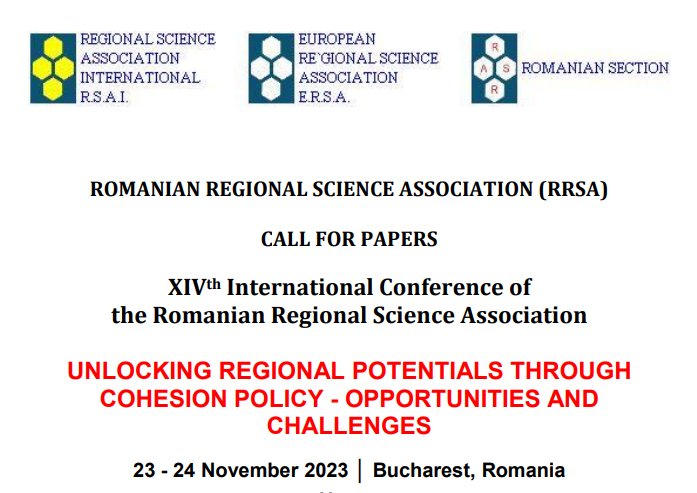Archives
Elisabete Martins
ERSA Monthly E-news - September 2023
|
|
|
|
|
|
|
|
|
|
|
|
|
|
|
|
|
|
|
|
|
|
|
|
|
|
|
|
|
|
|
|
|
|
|
|
|
|
|
|
|
NARSC Nominations | Awards | Conference
|
|
The latest issue of Regional Science Policy & Practice are available! Vol. 15, No. 7, September 2023, Special Issue:Pathbreaking trajectories: Socio‐economic and Institutional de‐peripheralization of marginal Areas
Volume 15, Issue 7
Pages: 1399-1665
September 2023
Issue Edited by: Luca Storti, Giulia Urso, Neil Reid
ISSUE INFORMATION
INTRODUCTION
Pathbreaking trajectories: Socioeconomic and institutional de-peripheralization of marginal areas
Luca Storti, Giulia Urso, Neil Reid
ORIGINAL ARTICLES
Luca Storti, Giulia Urso, Neil Reid
Dimitrios Tsiotas, Vassilis Tselios
Roberta Mingo
Laura Ryser, Joshua Barrett, Sean Markey, Greg Halseth, Kelly Vodden
Managing the fiscal linkage: Reinvesting fishery profits for development
Keith Storey
The digital divide and the growth of the hospitality industry: The case of Italian inner areas
Maria Giovanna Brandano, Alessia Mastrangioli, Alessandro Palma
How to unravel pathbreaking trajectories in the left-behind areas of Istanbul?
Ebru Kurt Özman, Tuna Taşan-Kok, Gülden Erkut
Evans Korang Adjei, Rikard Eriksson, Johan Lundberg
Loss and change: Culture narratives in old industrial regions in East Germany
Franziska Görmar
Yu Zhang
The economic impact of trade openness on Mexico's indigenous peoples
Haoying Wang, Rafael Garduno-Rivera
Liliana Castillo-Rivero, Marine Elbakidze, Philip McCann, Frans J. Sijtsma
Endogenously driven de-peripheralization through political secession: The case of the Donbas region
Courtney V. Bower, Mark J. Minton, John I. Carruthers
BOOK REVIEW
Frank J. Calzonetti
The latest issue of Regional Science Policy & Practice are available! Vol. 15, No. 6, August 2023, Special Issue: Sustainable Regional Development in Sub‐Saharan Africa
Volume 15, Issue 6
Special Issue:Sustainable Regional Development in Sub‐Saharan Africa
1127-1397
August 2023
Samuel Amponsah Odei
ISSUE INFORMATION
INTRODUCTION
Sustainable regional development in sub-Saharan Africa
Samuel Amponsah Odei
ORIGINAL ARTICLES
Kwame Adjei-Mantey, Millicent O. Awuku, Ruby V. Kodom
Gabriel Temesgen Woldu
Reverse Causal Nexus between Pro-Poor Policies and Income Inequality in Kenya
Isaiah Juma Maket, Izabella Szakálné Kano, Zsófia Boglárka Vas
Exploring the geographical variations and influencing factors of poverty in Nigeria
Richard Adeleke, Opeyemi Alabede, Michael Joel, Emmanuel Ashibuogwu
People with disability and access to financial services: Evidence from Ghana
James Atta Peprah, Eric Atsu Avorkpo, Evans Kulu
Ibrahim Abu Abdulai, Ibrahim Yakubu, Amos Dangbie Dordah
Yakubu A. Zakaria, Mary Asumpta Agamba, Mordze-Ekpampo Ibrahim Musah
Senanu Kwasi Klutse, Judit Sági, Gábor Dávid Kiss
Competitive agricultural input markets in Ethiopia: Theoretical promises versus reality
Zewdie Habte Shikur
Wycliffe Obwori Alwago
Geographical patterns of warehousing facilities in the Cape functional region, South Africa
Brian Fisher-Holloway, Masilonyane Mokhele
Regional convergence and catching up process in Africa: A tale of three clubs
Aomar Ibourk, Zakaria Elouaourti
Anis Ochi
BOOK REVIEW
Luca Storti
Call for Papers | 14th Conference of the RRSA, 23-24 November 2023, Bucharest, Romania
 ROMANIAN REGIONAL SCIENCE ASSOCIATION (RRSA)
ROMANIAN REGIONAL SCIENCE ASSOCIATION (RRSA)
XIVth International Conference of the Romanian Regional Science Association
UNLOCKING REGIONAL POTENTIALS THROUGH COHESION POLICY - OPPORTUNITIES AND CHALLENGES
23 - 24 November 2023 │ Bucharest, Romania
CALL FOR PAPERS: https://rrsa.ro/wp-content/uploads/2023/09/Call-for-Papers-Romanian-RRSA-2023-Conference.pdf
Details at www.rrsa.ro
Job Announcement - Assistant Professor, Dept. of Geography at The Ohio State University
The Department of Geography at The Ohio State University is accepting applications for a tenure-track Assistant Professor position in the field of transportation geography.
The department is primarily interested in applicants whose research and teaching are focused on transportation geography in an aviation context. The successful candidate will have research and teaching expertise in human and/or freight mobility at regional, continental, and/or global scales. This can encompass such areas as economic geography, the geopolitics of mobility, transportation systems and development, system resilience, weather and meteorology, climate change and climate-related hazards, as well as environmental, social, and economic sustainability.
More details can be found here: https://osu.wd1.myworkdayjobs.com/OSUCareers/job/Columbus-Campus/Assistant-Professor_R86656-1
Job Announcement - Assistant Professor of Public Administration, University of La Verne
The College of Law and Public Service at The University of La Verne invites applications for Assistant Professor position.
The College is seeking individuals who will demonstrate a deep commitment to teaching excellence, service to the institution and community, as well as further developing its national reputation in scholarly research. Successful hires are expected to participate actively in the College’s activities and meetings, as well as in relevant community and professional activities that enhance and promote the best interests of the programs and the College. Faculty in the department regularly attend and make presentations at professional conferences and maintain memberships in appropriate professional organizations.
The successful candidate will be expected to demonstrate and maintain a strong research agenda. Primary responsibilities for this position will be in both our Master of Public Administration and Doctorate in Public Administration programs (including service on dissertation committees), other responsibilities will be dependent upon candidate background and interests. Prior service in public sector or non-profit organizations is a particularly desirable qualification, as is a Juris Doctorate. We are especially interested in candidates who hold a PhD or DPA (completed by the time of appointment) in Public Administration, Public Policy, Political Science, or other closely related fields. Candidate should demonstrate strong teaching and research potential. Curriculum may be taught across multiple campuses and classes are delivered through various modalities that include in-person, online and/or hybrid. As such, some travel between campuses may be required. Candidates need to possess strong skills and pedagogical acumen in the virtual environment.
Please click this link for more details.
Job Announcement - Univ. of Montana: Director, Bureau of Business and Economic Research (BBER)
The University of Montana invites applications for Director for the Bureau of Business and Economic Research (BBER).
The position directs a high-visibility applied economic research program with a focus on the regional economy. The broad areas of research would include, but not be limited to, industries relevant to Montana and the mountain west, such as tourism, manufacturing, high tech, energy, and health care. The incumbent is expected to conduct peer-reviewed and client-specific applied research and to communicate findings to the public in non-technical language, including presentations at the Montana Economic Outlook Seminars.
The University of Montana is a flagship, research-intensive R1 institution with approximately 10,000 undergraduate and graduate students. It is located in Missoula, a culturally vibrant community of about 75,000, surrounded by mountains and three rivers converge. Abundant recreational opportunities in surrounding state and national forests and nearby Glacier National Park and Yellowstone National Park complement a thriving intellectual atmosphere.
The Bureau’s purpose is to serve the general public, as well as people in business, labor, and government, by providing an understanding of the economic environment in which Montanans live and work.
Please follow this link here for more details.
RSPP Special Issue Award | Winners 2023
RSPP Special Issue Award
For the Best Special Issue Editors in Regional Science Policy and Practice
RSPP Special Issue Award aims to stimulate the quality of an enlarged editorial team focused in the edition of Special Issues.
RSPP Special Issue Award prizes the special issues with more than seven papers, published two years before based on their citations per paper and the judgement of a jury composed by three Fellows, the President and the Immediate Past President.
Winners 2023
Following the rules of the RSPP Special Issue Award the recipients of the RSPP Special Issue Award in 2023 based on the special published in 2021 and approved by the Jury composed by Hans Westlund, Eduardo Haddad, Gordon Mulligan, David Plane and Phillip McCann are:

1st Place Neil Reid for the Special Issues on “Effects and Policies of Covid-19” with 8 papers and 44 Cite Score citations (ratio 5,50) in September 2023.
|
|
 
2nd Place Eveline S. van Leeuwen and Solmaria Halleck Vega for the Special Issue “Voting and the rise of populism: Spatial perspectives and applications across Europe” with 10 papers and 50 Cite Score Citations (ratio 5,00) in September 2023. |
|

3rd Place Paolo Postiglione for the Special Issue “New directions for regional analysis: Methods and applications” with 11 papers and 49 Cite Scores citations (ratio 4,45) in September 2023. |
Call for candidatures for new RSAI president
Dear Members of the Regional Science Association International,
according to the RSAI Constitution, each first year of term of the RSAI President, the Association faces the pleasant task of electing the Incoming President, who will in 2024 take on the position of President Elect, and work along with Prof. Hans Westlund, current RSAI President, to gradually move on to the position of President in 2025. Here is an excerpt of the rules of the Association for managing this important step:
Nomination committee. The RSAI Council has appointed a dedicated nomination committee, that following the rule of the RSAI Constitution is made up of the RSAI President (Hans Westlund), the RSAI Immediate Past-President (Eduardo Haddad), four members of the RSAI Council (one each from among the council members who are appointees of the four superregional organizations: Eveline Van Leeuwen for ERSA, Lily Kiminami for PRSCO, Carlos Azzoni for LARSA; Sandy Dell'erba for NARSC), and two members of the Long Range Planning Committee (LRPC) recommended by the LRPC itself (Kingsley Haines and Yoshiro Higano).
Criteria of the nominees. The nominees should satisfy the following criteria: a) financial resources sufficient to cover travel costs to perform RSAI duties; b) support from candidate’s institution including relaxation of duties to enable President to travel as needed to execute RSAI business; c) RSAI Council experience (Council member experience) and/or other service to the regional science community (e.g., supra-regional and/or other sections, editor or one of the regional science journals, etc.).
Election procedure. The President Elect nomination committee shall [...] make a recommendation to Council at a Council meeting of this same year . Upon receiving this recommendation, the Council will select a nominee. The President‐Elect and Vice‐President shall start his/her appointment at the start of the next calendar year (i.e. the second year of the current President’s term).
RSAI members from the PRSCO area who want to be nominated as candidate for the President of the Regional Science Association International should send to This email address is being protected from spambots. You need JavaScript enabled to view it. (cc-ing the RSAI ED at This email address is being protected from spambots. You need JavaScript enabled to view it.) within Oct. 14, 2023 the following material:
- A two-page CV and a Picture;
- A two-page statement on the motives in support of the candidacy and on the future strategy for the RSAI.
The Nomination Committee will then nominate the candidates to be voted on-line by the Members of the Council. Results will be diffused through in RSAI webpage.
Thank you in advance for participating in this crucial stage of the Association's life,
Kind regards,
Andrea Caragliu
About Us
The Regional Science Association International (RSAI), founded in 1954, is an international community of scholars interested in the regional impacts of national or global processes of economic and social change.



 Dear Members of ERSA, dear Colleagues,
Dear Members of ERSA, dear Colleagues,


 Recently posted video from #ERSA2023 Congress
Recently posted video from #ERSA2023 Congress


















